On Friday, I gave this talk at oSTEM’s annual conference. For those asking for the slides and links, I think it’s all here. I pre-recorded the talk; here are the videos for Part 1 and Part 2. The transcript is below (lightly edited for clarity) with slides embedded, but you can also download the entire deck (with bonus slide!).
Main Idea: modern homophobia and modern policing were invented at the same time, and for the same reason. They are still entangled today, and to end one, we have to end both.
Wait, what?
Yes.
Policing can end. And it will have to, if we want to live without homophobia.
If you have questions about police abolition, a great place to start is Project NIA’s videos and discussion guides for talking to kids. They’ll respect your intelligence but also explain things concretely, clearly, and without assuming background knowledge. Other excellent resources on why prison abolition is necessary for queer and trans liberation are the Sylvia Rivera Law Project, and the Transgender Intersex Justice Project.
Introduction
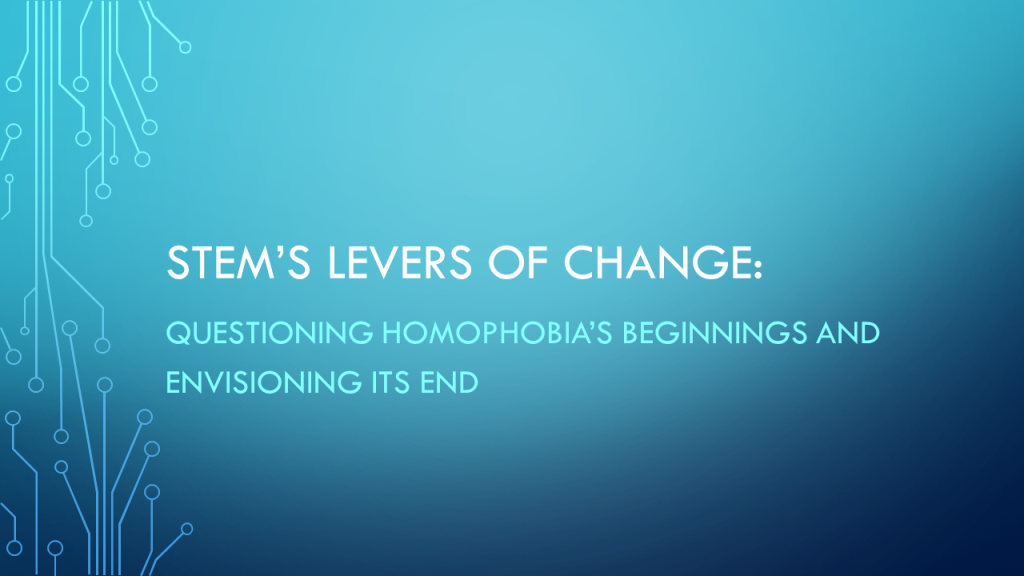
I named my talk Questioning Homophobia’s Beginnings and Envisioning Its End: STEM’s Levers of Change. I’ve been envisioning the end of homophobia my whole life, and I used to think that it would happen by getting legal and policing systems to stop criminalizing queer and trans lives. Now I think that legal systems need to be completely changed from preventing crime to preventing harm, and policing systems have to be completely replaced by systems of accountability and support.
I’ll tell my personal story of working against homophobia, and link it to a collective story of working against policing. I hope my journey might help others who are trying to understand these issues well enough to transform them.
Content Warning
I’m not going to spend lots of time describing violence, but I will talk briefly about my experience. I’m not going to show grahic imanges or discuss details of trauma. I’m also not going to shy away from discussing how homophobia, racism, and colonialism influence each other. I don’t think any of those stories makes sense without the others.

My Background
I started my career 25 years ago as a database developer, then studied electronics. I’ve worked as a hardware and firmware technologist in oceanographic R&D. For the last ten years, I’ve been teaching electronics at a community college as well as continuing to work in industry.

I did most of this in Nova Scotia, Canada – never-surrendered territory of the Mi’kmaq, today and since time immemorial. That’s where I went to university for computer science, and left after a year and a half. I had a full scholarship and a spot on the dean’s list; I also had green hair and combat boots.

Individual Allies Don’t Fix Systems
I was so intensely isolated as the only visibly queer, gender non-conforming, person who got read female in my classes, that eventually it wasn’t worth it to be miserable every day. But I learned some important things. Not how to code – I’d been doing that since I was in elementary school. I learned that people who are willing to support you, even when it causes some unpleasantness for them, can brighten your day. Like the series of straight male profs who made a point of giving me support, intellectual challenge, and constructive feedback and got complaints from the men in my classes.
I also learned that kind individuals were simply not enough. This kid, and surely lots of others, got ground down by the ways that everything from economics class to club socials relentlessly emphasized that everyone wants to watch football, get married, and get rich. After 18 months of dreading getting out of bed in the morning, I dropped out.
But it was the late 90s and the .com boom; jobs were plentiful. If you went to a job interview and wrote some decent code, you could get a decent offer, even without a diploma. I started working in software development. After a few years, I went back to school to study electronics. After that, I got that job doing electronic design for an oceanographic R&D institute.
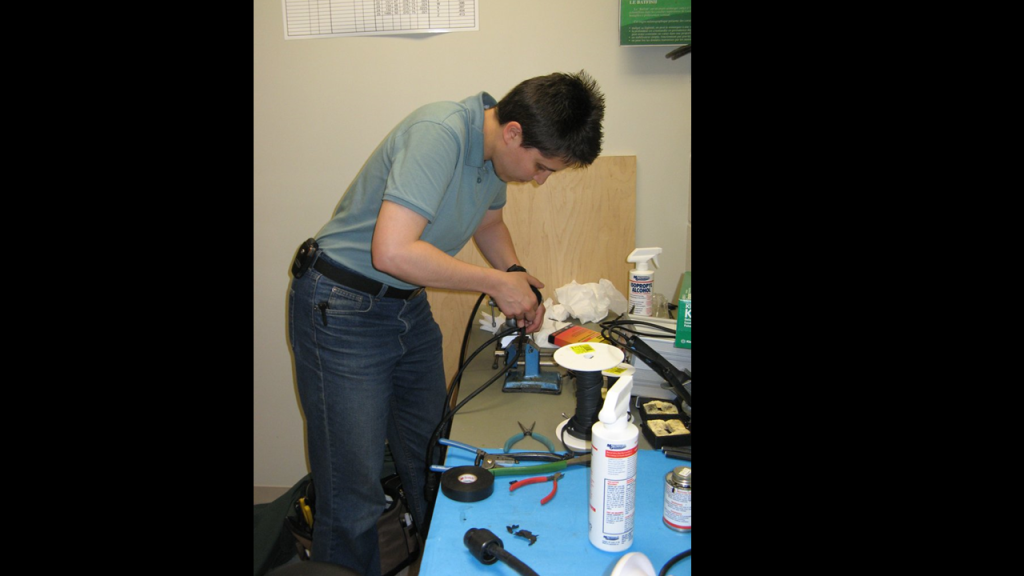
Once again, some principled men who believed in me taught me how to submit a strong job application, and made sure I got good training once I was in, even when others looked down on them for “wasting” their time on me. And still, when others at the lunch table were trading stories about first dates or heartbreak, somehow the conversation ended quickly if I joined in; yet somehow I couldn’t escape the straight people who insisted, one-on-one, on grilling me about how the gay agenda was ruining their church. The microaggressions weren’t as bad as the sheer isolation. I allowed myself 10 min per day as a crying break. Since there wasn’t a single other person in that wing of the building who used the women’s washroom, I at least had a bit of privacy.
For a long time, I thought that if there was only more diversity training, more awareness, then I wouldn’t be exhausted all the time.
Diversity Training Is Neither Sufficient Nor Necessary
I still think good training matters; for those who are trying to learn, it can help with getting unstuck.
But I also look back on my history of finding allies in unexpected place. I now realize that there are straight people who decide to google unfamiliar words instead of asking queer people to explain over and over the difference between sexual orientation and gender identity. There are cisgender people who don’t really understand non-binary identity, but they know meanness and violence when they see it and are perfectly capable of saying “That’s not ok” even if they’re not completely sure how the gender unicorn works. Training might make them better at it, but people who want to take a stand are quite capable of doing so, and they sometimes do.

Discriminatory Systems are Harmful Even With Good People and Good Training
So. I no longer believe that we are discriminated against because there hasn’t been enough education of mean or ignorant individual. Some people know perfectly well what they’re doing and choose to retain power anyway. Others try to be allies and yet homophobia still doesn’t go away.
Now I think that people will change their minds only after the system around them changes. And, even if all the people were kind, the rules by which we play cause harm anyway. That’s what systemic oppression means to me.
For example, I’ve worked in a place where the majority of staff genuinely believe they are committed to equality. There are equity policies and offices and managers. Yet when I was stalked and threatened by a coworker, it took a full year for my supervisors to take action. They told me how sad they were that it had happened; they referred me to the employee assistance program’s counselling services. But they did not do anything to keep me safe or hold that coworker accountable, until I got lawyers involved. They genuinely believed that following the policies, and telling me how very much they support me and are against homophobia, was enough.
I learned is that teaching people to not feel homophobic, or racist, or ableist, is not enough to end oppression.
I sure did try though. I did lots of different kinds of teaching. In my 20s, I joined a group where white people educated other white people about how to undo white privilege. I tutored classmates and mentoring co-op students. I became a classroom teacher. And I saw some patterns emerge – among electronics students studying physics, as well as people learning about racism, homophobia, and transphobia.
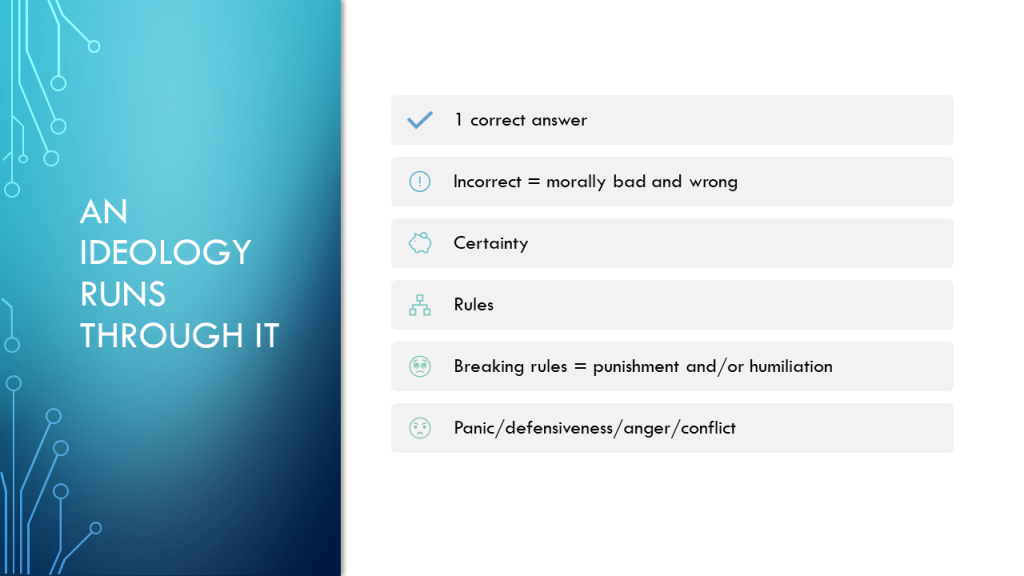
Right Answers and Good People
Whether they were students learning circuit analysis, or straight people learning to welcome LGBTQ+ coworkers, I saw a relentless, panicky desire to have rules that always lead to the right answer, and an assumption that there is a perfect, correct answer. Only one of them. This panic seemed to grow out of an experience that an answer that was factually wrong was also morally wrong – that bad answers made you a bad person – and that moral wrongness somehow had to be punished. It led to people both being defensive about being wrong, and assuming that if they followed the rules, they were guaranteed to be above critique. It didn’t make much sense to me at the time, so I’ll come back to it in a few minutes.
The Early Modern Period in Europe
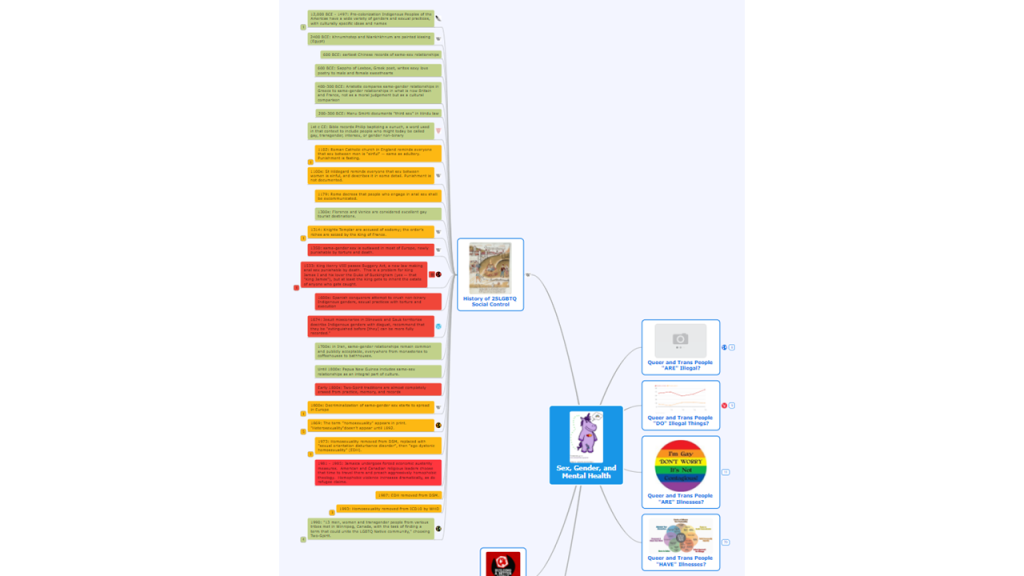
Around the same time, I started to research the history of homophobia, for professional development workshops I was doing on gender identity and sexual orientation. This is a snapshot of a slide I made for one of those workshops; I won’t go into the details but it’s a timeline of attitudes from 12,000BC at the top, to 1990 at the bottom, with red representing more negative attitudes and green representing more positive. (Click through to explore that mind map on Sex, Gender, and Mental Health, and all its resources)
As you can see, I didn’t find the ever-improving progress from antiquity to the current day that I had been led to expect. Instead, I learned that different places, and different times in history, have a huge variety of attitudes. Many cultures around the world have words for 3, 4, or more genders. Over the thousands of years of human history, these attitudes sometimes got more favourable, sometimes got worse, and were often different even in neighbouring towns or ethnic groups.
That’s true until about 500 years ago. Let me show you on a slide that’s drawn to scale on the time axis.

In the top band, you can see a few major historical events that people might recognize from Canadian and American history textbooks. It’s far from comprehensive but should give a sense of scale.
There’s the date of the earliest foundations at what would become the city of Jericho, dating back almost to the end of the last ice age. You can see the beginning of Egyptian civilization, the beginnings of human habitation in Britain, the lives of the founders of the three major monotheisms, and the red line shows where we are today.
In Mi’kmaki, shown on the middle band, early villages have been dated to shortly after the end of the last ice age; Kejimkujik is a significant place in Nova Scotia, there are stone eel weirs that still exist and are bout the same age as the Egyptian pyramids.
The bottom band shows what Europe calls the transition from the middle ages to the early modern period. As you can see, there’s a cluster of things that all happen practically on top of each other, about 500 years ago. [The full timeline has lots more info and detail.]
Invention of Homophobia to Seize Private Property
From 1350 to 1533, a wave of laws swept across Europe making same gender sex not only suddenly illegal but punishable by death. Before that, in many places, it hadn’t been on the books at all. The new laws made it so that when you were executed, your heirs didn’t inherit. Your property reverted to the Crown. And we find that, during this wave of violence sweeping across Europe, including witch trials and intensifying anti-Semitism, another pattern was emerging: the people being prosecuted for same-gender sex were disproportionately people who had land that the monarchs of Europe wanted for themselves. This was all made possible because European aristocrats were in the process of inventing private ownership of land.
Before this time, you couldn’t buy and sell land any more than you could buy and sell a river; there had been laws that governed who could use the land, including land held in common for shared use by the peasants. But in short order, monarchs across Europe started seizing the country houses of any gentry whom they could get away with accusing of “buggery”.; once you were accused, there was no way to prove you had never done it. Actual guilt was immaterial.
Aside: King James Was the Gayest King

Besides, King James was one of the gayest gays there was; his love letters to the Duke of Buckingham survive, and they are NSFW! It wasn’t about what you did with whom. It was about whether you had land that the King wanted, and whether the public would be too scared to defend you.
From Self-Sufficiency on the Commons to Poverty and Factories
However many rich landed gentry were affected, exponentially more peasants were affected by the seizure of the commons (the Enclosure movement) that pushed them off the land that they had used for grazing, gardening, and living. This made masses of people suddenly homeless and unable to feed themselves. Conveniently there were these new things called “factories” in the cities where, if you made three pairs of shoes for sale to other people, you would be given enough money to buy one for yourself…
Invention of Policing
The new borders of privately owned land had to be enforced. Peasants weren’t going to evict themselves. So it’s at that time that the monarchs of Europe created another new thing: the modern concept of policing. Think for a moment about the word Landlord; the lord part refers to its origin in the British peerage. One of the things people got when theywere granted the “title” of duke or count was the right to first control, then own land; we still call it a land title today.
Here is where the two threads of this talk weave together.
Modern policing was invented to protect aristocratic land ownership. Modern homophobia was invented to enable the seizure of that land in the first place.
Colonialism and Enslavement
European aristocrats soon ran out of land in Europe to seize; the very next thing that happened is that the monarchs of Europe started seizing land all over the planet, exporting their new and increasingly outlandish laws to justify both the theft of the land, and the decimation of those lands’ Indigenous peoples. Colonists brought with them private ownership of land, policing, and homophobia – which they used to criminalize Indigenous forms of relationships (often not “straight”) and genders (often not binary).
[See for example:
]
But the rich Europeans also created new ideas to justify the violence: they invented whiteness, and chattel enslavement to go along with it. The ancestors of African-Americans, African-Canadians, and other African diasporas were forced into stolen labour on stolen land because of this. Unsurprisingly, the concept of policing that had been created to protect aristocrats’ ability to own land, immediately gets extended to protect their ability to control the people they enslaved in order to work that land.
The idea of assigning rights to racial groups as we know it today, with rigid and binary borders about who belongs to which “race”, encoded in law and policed with force, emerged in Europe and its colonies as a way to protect European aristocrats at home and abroad. “Race” as we know it today was famously codified by Linnaeus. He’s more famous for inventing binomial nomenclature for naming species, but it’s the same guy.
Scientific “Revolution”
Which brings us to the role of science. What we now call the Scientific Revolution – often considered a period of intellectual revival and growth, from Copernicus to Newton – was a time of massive violence and worsening social position for everyone except the aristocratic families who had noble “titles” or were otherwise able to own land. And even some of those got killed. It might seem like science and violence would be in conflict, but it turns out that they protected each other. Remember these patterns?

These are patterns of thought that became dramatically more prominent in the same time period. And they were deeply useful for justifying colonialism. For example, borders shifted from being blurry and overlapping to being binary; you were either on one person’s estate or another’s. Genders shifted from being multiple and on a spectrum, to being binary – and narrow. Single correct answers were authoritative and enforceable; the ways of thinking of other cultures could be considered wrong, and punished.
White Supremacy Culture and Binaries

Tema Okun wrote an article about the ideologies that underpin white supremacy, and contribute to its survival. They include things like perfectionism, only one right way, and either-or thinking – eerily similar to the patterns I noticed among students learning electronics as well as straight people learning how to interact with queer co-workers. Often, both groups seemed to yearn for rules about words that would confer correctness. Is “queer” a good word? Or a bad word? People with previous knowledge delighted in telling me that they knew “Transgendered” is wrong – forget about the housing discrimination, violent health care experiences, or over incarceration… it’s the letters “ed” at the end of the word that cause problems. As if eliminating those letters would fix everything.
As science absorbed white supremacist underpinnings like binarism and individual moral goodness, it justified colonialism – and the new colonialism, in return, crushed entire cultures and decimated their scientific knowledge, clearing a path for European thinkers to appear unparalleled.
Abolition of Policing and Prisons
And now here we are. Trying to end homophobia. At a time when police violence, state-sponsored killings of Black people, incarceration, violations of Indigenous sovereignty, and violence against the earth are spectacularly revealed.
We can educate ourselves and each other; that can help us choose how to act, and to which commitments we hold ourselves accountable. But if homophobia was caused by control over land and labour, and continues to drive down wages and therefore increase profits, then it will not be fixed by education. It will have to be ended by relinquishing the current forms of control over land and labour.
We can eliminate some aspects of policing by decriminalizing homelessness, poverty, sex work, and drug use. Universal basic income, collective or cooperative housing and food-sharing, skillful mental and physical health care, and emergency crisis intervention are all things that our society is perfectly capable of providing to all, if we are willing to accept reduced profits for billionaires; meeting people’s basic needs would prevent the need for most of what police departments do in the first place. Other aspects of policing can be replaced by allowing communities to design their own ways to hold each other accountable for harm (many communities are already experimenting with restorative justice or transformative justice projects). Punishment doesn’t repair harm, hold people accountable, or prevent future violence; it just gives the state a legal monopoly on violence and abuse.
There was a time before land, labour, borders, race, and gender were controlled and punished in this way. In human history, that time was barely a blink of an eye. We can undo all of them. They will stand together, or they will fall together. And, if we want humanity to have a chance at a future, they will have to.
Pause for Reflection
For those who experience white privilege: what was your family before they were white?
For everyone: What do you notice? What do you wonder? What does your learning need right now?
Abolish Whiteness and Homophobia Like Monarchy
It might seem like white supremacy and heteronormativity are inevitable. But it would once have seemed impossible to end monarchy. When we talk about ending the system of monarchy, we don’t mean that some people continue to be dukes and princes, except now they have sensitivity training, and they learn to be nicer to the peasants. It means that no one is a prince any more. It means that everyone has decent food and housing, including the former princes, because the nobles aren’t hoarding it. If we can end the status of noble titles, we can end the status of whiteness.
We can, absolutely, end homo/transphobia – if we end whiteness, and colonialism. Transphobia, in particular, in its control over who can marry who, who can raise children, who controls inheritance, and how gendered work gets done and paid for, is spectacularly useful for enforcing control over land, labour, and borders. It is not a coincidence that trans and gender-non-conforming people are very disportionately harassed by police, that the industries and neighbourhoods where we work are criminalized. White supremacy is not going to let a lever like that go without a fight. What it might do, is let us feel like we’ve won a few victories – possibly by letting the standard of living for white trans people rise just enough that we stop fighting wholeheartedly. We have a duty to reject that.
Abolish Policing
In order to do that, we’ll have to end policing.
Police brutality is on the news everyday, and I see a lot of people getting tangled in bottomless debates about whether individual staff members of police departments are bad or good. That’s exactly the booby trap that white supremacy culture has laid for us: bad or good? Perfect or horrible? But no individual is the point. When people around the world came together to ban landmines, we didn’t argue about whether individual soldiers who planted land mines were kind to their children and pets. We just understood that landmines had to go.
Policing is not a necessary part of a society. Until 500 years ago, it didn’t exist as we know it, and lots of societies flourished and accomplished great things. I’m not saying that feudalism was great, but I am saying there are other place besides Europe where we could look for examples. White people always ask at this point, “what about the bad people? Who can I call?” What if the person who got called was…. All of us? How many of you have walked out onto your step when it sounds like there’s a fight next door, or stood beside someone getting harassed on the bus or in a school hallway? Policing systems currently do not do that, because people being harmed are an afterthought in policing’s design. Policing only really does a good job of defending against threats to property, because that’s what it was designed for. For every instance of harm to a person that it interrupts, how many more are there that it creates? Policing is running a huge violence deficit. Policing is about obedience to rules: we have law and “order”, crowd “control.”
I am interested in reducing harm (not crime), increasing accountability (not obedience). Policing is not.
Remember the landed gentry who got killed in the early modern purge against same gender sex? Their privilege did not protect them. Ours will not protect us. But ending the system of white status has a chance of saving us all.
Actions We Can All Take
I’m outside of Portland, Oregon these days. It’s a land with long relationships to the Kalapuya, Molalla, Multnomah, Clackamas, Chinook, Tualatin, and many other nations.
Abolishing police isn’t an uncontroversial position, even here. And even if we agree that that’s where we want to go, there isn’t “only one right way.” Here’s something that helps me when I’m figuring out how to pick a path.
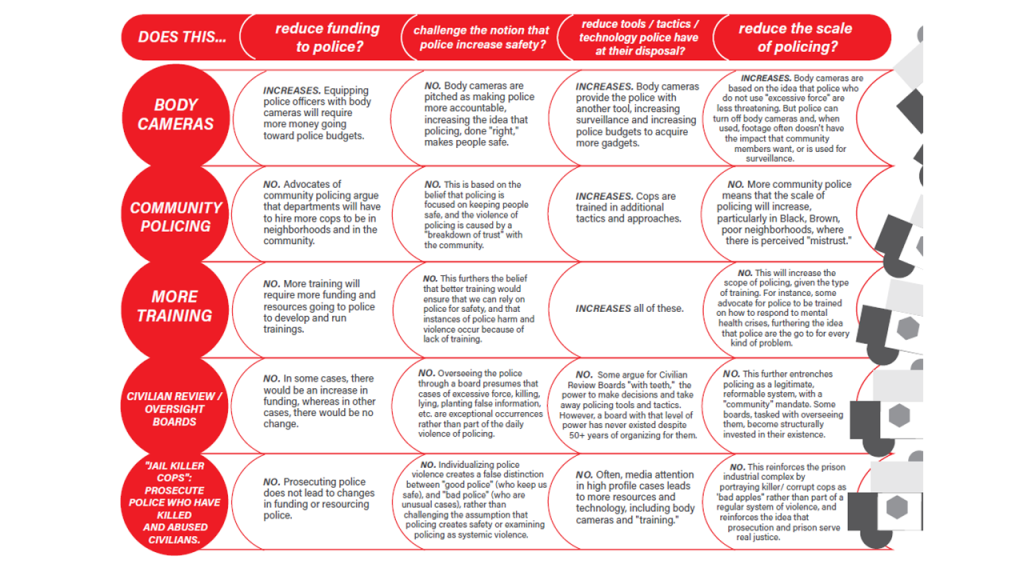
Does it
- Challenge the notion that policing increases safety?
- Reduce the tools/tactics/ technology police have at their disposal?
- Reduce the scale of policing?
- Reduce funding?
Critical Resistance gives some specific examples in this infographic about Reform vs Abolition of Policing. What if instead of body cams and civilian oversight boards, we simply capped overtime? Here’s a shocker – what if police who are convicted of use of excessive force, could not draw their pensions?
By the way, did you know that when police go to trial for excessive force, they don’t pay their own court costs? Doesn’t it seem odd that doctors and lawyers are required to carry malpractice insurance and police are not?
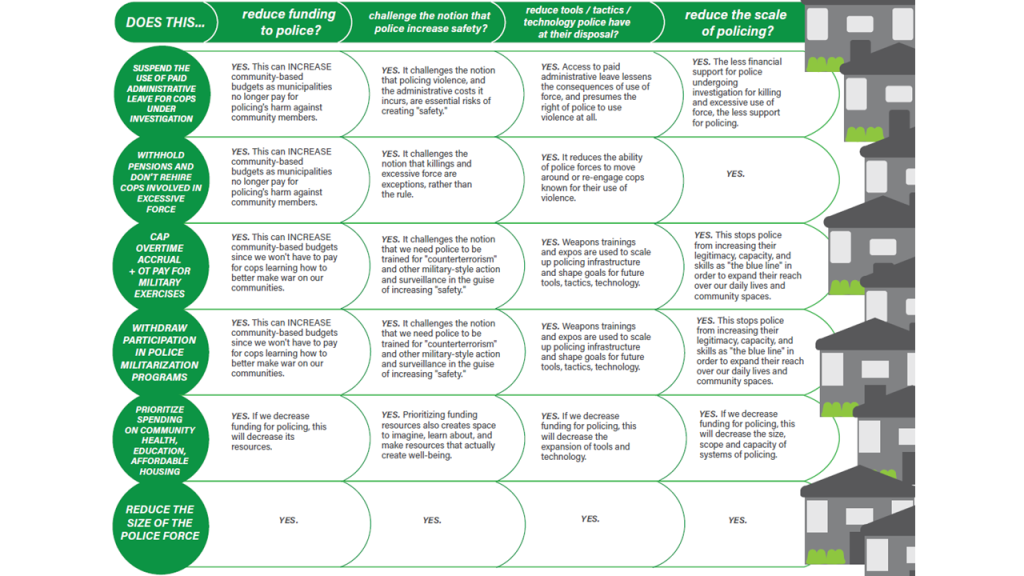
I’m learning that, in the rare cases when police are convicted of use of excessive force (which is almost never, because they define the rules so they are almost never considered to have broken them), but even when they are convicted and fired, they are often quietly rehired shortly afterwards. What if we just, didn’t?
Collective Actions for STEM and Academia
Those are project that all of us can work on. But for those of us in STEM, there are some particular opportunities and levers. Modern science was brought to its current prominence as a tool to support the colonial wealth project. But exactly because the system depends on us so heavily, we have tremendous leverage to make change.
There are a myriad of collective projects where we can use our particular expertise – or withdraw it. Some examples include:
- refusing to allow policing in our schools
- refusing to provide technology, including predictive algorithms, to police departments
- banning specific technologies (as with campaigns against land mines, nuclear weapons, etc)
- requiring that research be done by and for the communities who are most affected by the research process or results
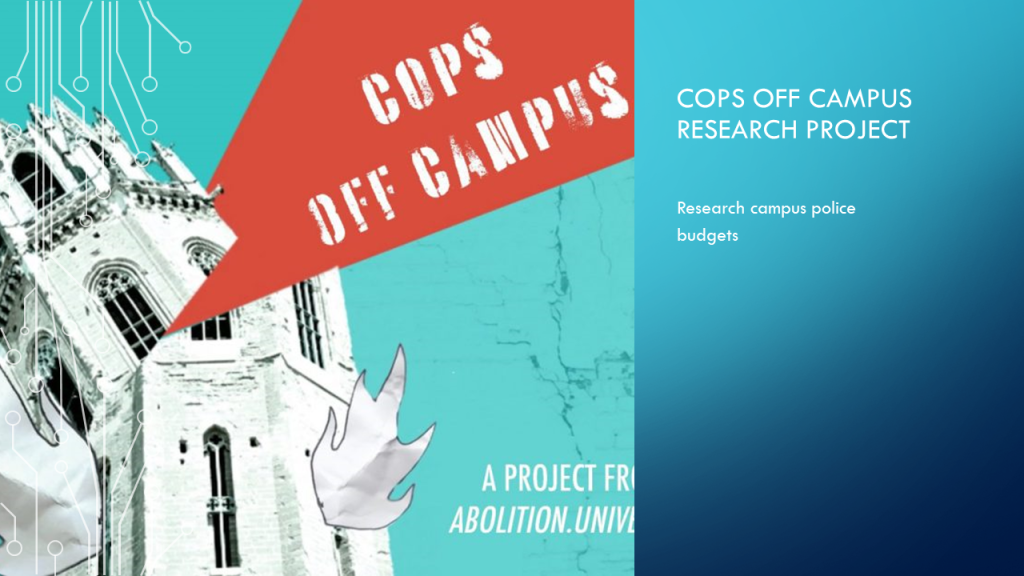
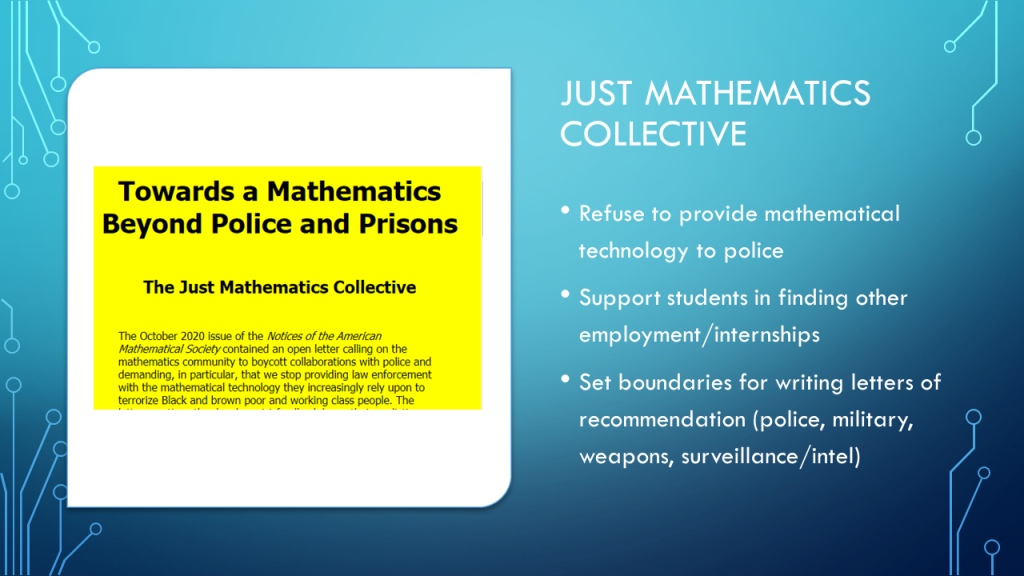


Individual Actions for Everyone
There are also techniques we can use in our everyday lives that I have gotten a lot of use out of. I try to embed these into my ways of teaching, and also to teach them to my students. They can help us break the habit of punishment-based, single-correct-answer ways of thinking, and expand our ability to imagine what a collaborative society could look like.
A: Shift from being motivated by fear (“am I following the rules?”) to accountability (“what is the most positive effect I can have on the community I am trying to support?”)

B: Evaluate multiple good answers – and ask our students to do the same. Check for white-supremacy values like perfectionism, and substitute accountability and humility.
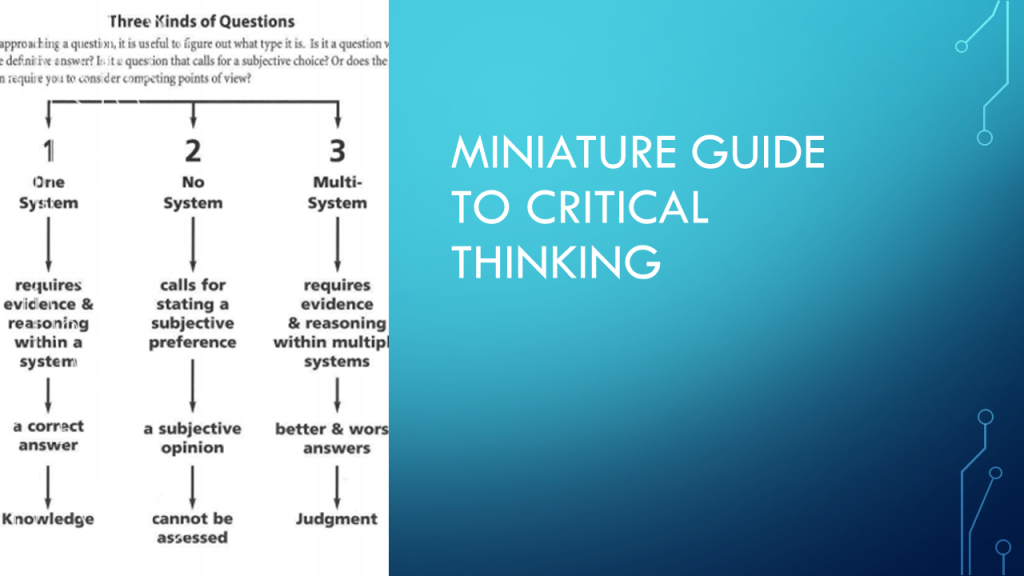
C: Role play hearing no, without panicing or jumping to explain your feelings in a way that requires the other person to soothe or reassure you.
D: Learn to do a body scan. Get familiar with the distinction between emotions (happy/angry/sad/etc) and sensations (headache/nausea/muscle tension/etc). Practice noticing when your actions alleviate uncomfortable sensations/emotions, and whether they are having that effect on others! The classic booby-traps are guilt and anger. Develop a healthy relationship with them — that means offering and receiving challenge, support, and boundaries.
E. Be intentional about when you express emotions. Just because I feel it doesn’t mean I have to say it. Will it put the other person in the position of comforting me? Am I changing the subject onto myself?
It is time to break our contract with whiteness, heteronormativity, and punishment. And it is ok to choose to fail to meet someone’s needs. When white people have a need for dominance, we are not obligated to fill that gap.
Abolition: Better for Everyone
Why would we protect billionaires,the heirs of the old aristocracy, when we could be protecting each other? Would you be willing to abolish the status called whiteness if it meant everyone could eat? Would you be willing to live without cisgender lives being considered normal, if everyone had a safe place to live? If no one was killed by police? If homophobia would end?
Ending whiteness is a long collective project. Ending homophobia is a long road of change. But ending policing, and recognizing Indigenous sovereignty, are concrete steps on that path. We have a tremendous opportunity to start there, and we have specialized skills that are needed to close the chapter of the old world and build the new one. I look forward to finding new colleagues here, and creating new ideas with you.
Sources
Uncredited ideas are mostly taken from Silvia Federici’s Caliban and the Witch (in print from AK Press or free online in PDF format). For deeper analysis, I recommend Sandy Grande’s Red Pedagogy.
Additional Resources
For those who are interested in how to support students in transitioning from “right/wrong” thinking to “multiple good answers”, you might be interested in my talk on Assessment Practices and Transforming our Relationships to Power.